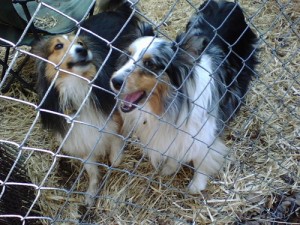An Aging Dog or Cushing’s Disease, The Subtle Signs
 My yin-yang shelties are eight years old. I adopted Tuatha when he was eight weeks old; Echo at eight months. He, Tuatha, is the extroverted, demonstrative one who will bring poor guests endless sticks, balls and plush toys to throw. She, Echo, is reserved, waiting for the quiet moment to greet a guest with her “still waters run deep” energy.
My yin-yang shelties are eight years old. I adopted Tuatha when he was eight weeks old; Echo at eight months. He, Tuatha, is the extroverted, demonstrative one who will bring poor guests endless sticks, balls and plush toys to throw. She, Echo, is reserved, waiting for the quiet moment to greet a guest with her “still waters run deep” energy.
The yin-yang comparisons continue. He, the jock, eats to live. She, the former kennel dog, lives to eat. He runs to Mama at every fright. She is my brave protector. He campaigns for, and gets, lots of my attention. And until recently, I believed my slower, calmer dog was content by herself in the corner.
Now I am checking her feelings under those still waters, and valuing every moment we share, because we may have less time than I thought.
 She has always taken her food and water as if she were still competing with her kennel mates. But recently she began drinking so much water so quickly that, minutes later, she would throw some up. And, data in, data out, she needed to pee constantly. I had thought she just craved oral gratification. But the vomiting put me over. I wondered if the drinking meant diabetes.
She has always taken her food and water as if she were still competing with her kennel mates. But recently she began drinking so much water so quickly that, minutes later, she would throw some up. And, data in, data out, she needed to pee constantly. I had thought she just craved oral gratification. But the vomiting put me over. I wondered if the drinking meant diabetes.
The vet quickly ruled out diabetes, and agreed with me that her symptoms were subtle. Dogs often throw up. It’s a dog thing. But Echo’s kidneys weren’t functioning well. The vet suspected Addison’s disease, but now it appears she has the opposite of Addison’s: Cushing’s disease.
 In Addison’s, the body produces too little glucocorticoid, in Cushing’s, it produces too much. Having visited a few sites on Cushing’s, I now suspect that Echo has been dealing with this imbalance for most of her life. I recall noticing certain symptoms, which I assumed were simple variations in body type or behavior:
In Addison’s, the body produces too little glucocorticoid, in Cushing’s, it produces too much. Having visited a few sites on Cushing’s, I now suspect that Echo has been dealing with this imbalance for most of her life. I recall noticing certain symptoms, which I assumed were simple variations in body type or behavior:
- A barrel shaped gut, which I pondered each time I bathed them. Tuatha has a more hourglass, slender waist and Echo has always been thick there. But then again, she likes food…
- Over eating/food stealing. Echo has competed for her food, even though she no longer has to. Since I know shelties can be prone to obesity, I’ve watched her portions like a hawk and police the food stealing…
- A thinning of the face. I noticed this a while back and dismissed it. Now it is not noticeable. But it is listed as a sign of Cushings.
 Lethargy. Echo has always been slower, less athletic than Tuatha. Again, it has been easy to excuse this as individual variations between dogs. People have assumed she was his mother, or at least a much older dog. I’ve just answered that she’s an old soul.
Lethargy. Echo has always been slower, less athletic than Tuatha. Again, it has been easy to excuse this as individual variations between dogs. People have assumed she was his mother, or at least a much older dog. I’ve just answered that she’s an old soul.- Hair loss. Echo’s hair is not to the point of the characteristic balding around the abdomen associated with Cushing’s, but it has thinned generally. Now I watch it more closely.
- Urinary tract infection. Another issue with Cushing’s, Echo did a round of antibiotics that failed to clear out her current infection. The vet’s having another look at her urine to better target the next meds for her specific infection of the moment.
Now I appreciate that Echo probably has been suffering in silence for a long time. Although I want to blame myself for not visiting the vet years ago, the truth is, most people do miss these signs, which are subtle and typically associated with aging.
It looks like we should be able to control the imbalance with medication eventually. And I’ll also look for alternative treatments. I hope that it doesn’t have to mean discomfort or a shortened life for my brave protector.
What are your experiences with Addison’s and Cushing’s? These are people diseases, too! I’d like to hear your stories!
